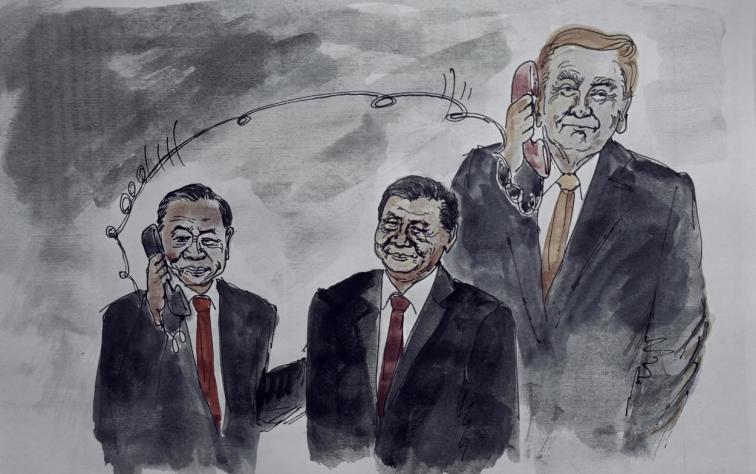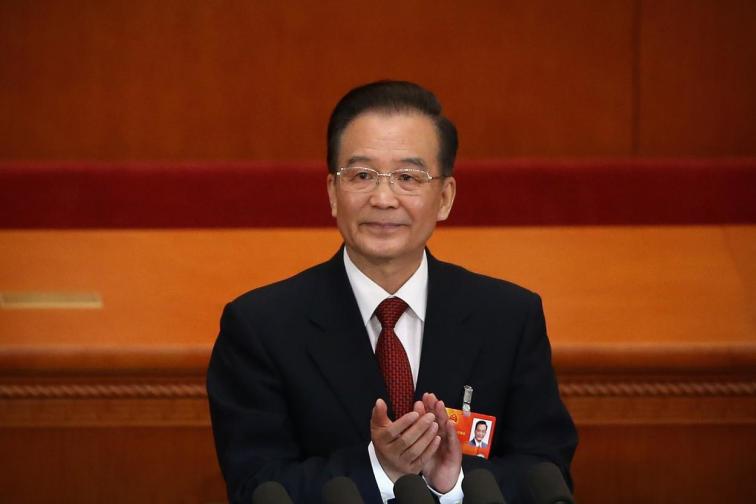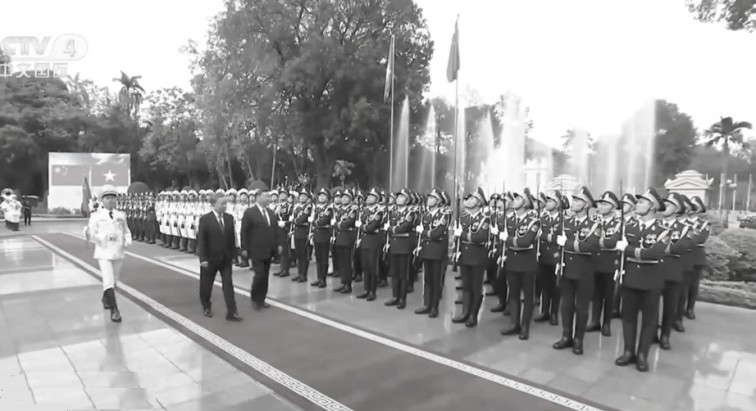The picture shows Cai Qi, a member of the Politburo Standing Committee of the Chinese Communist Party, attending the National People's Congress on March 12, 2023. (Screenshot from the web)
[People News] On June 16, Xi Jinping held talks with Kazakh President Tokayev in Astana. Among the officials seated beside him was Cai Qi, Director of the General Office of the CCP and a trusted aide. Yet Cai was noticeably distanced from the “core” of power, sparking speculation: Was the spacing a matter of security, a political signal, or a staged photo op reflecting an inner power struggle?
The answer may be: all of the above. But ultimately, this reflects a silent internal battle at the heart of the Chinese Communist Party’s power structure.
The Anxiety of One-Man Rule: Cai Qi’s Existence Signals Insecurity
Cai Qi holds a uniquely powerful position in the Party: Director of the CCP General Office, First Secretary of the Secretariat, and member of the Politburo Standing Committee. These three roles make him the closest official to Xi Jinping. And therein lies the problem: the closer one is to the “Emperor,” the more likely one is to be suspected. The more one is trusted, the more likely one becomes a scapegoat. The shadow of Li Keqiang’s mysterious death still looms—and surely Cai Qi, the Party’s No. 2, is concerned about his own fate after retirement.
Xi Jinping has repeatedly emphasised the need to "eliminate political risks" and leave "no blind spots in security," reflecting his deep distrust of those closest to him. His two most vital security "blades"—Cai Qi and Minister of Public Security Wang Xiaohong—hold control over his personal protection and broad surveillance systems. They are his most relied upon and, simultaneously, his most feared.
The Limits of Loyalty: How Cai Qi Protects Himself
Cai Qi controls the Central Guard Bureau and is privy to all of Xi Jinping’s secrets—his schedule, health, family—all are under his watch. He is the first in CCP history to concurrently serve as both a Standing Committee member and General Office director, and the first to accompany the top leader on foreign visits while serving as Secretariat Secretary. As the "Grand Steward of Zhongnanhai," he was once Xi’s most loyal political executor.
But Cai knows his position is based on temporary trust, not institutional guarantee. He cannot become the “core” himself, has no further path upward, and may even face future purges. Xi’s repeated shuffling of General Office personnel and cleansing of the security system essentially holds a knife to Cai’s throat.
Thus, the visual distancing seen in Astana becomes a subtle move—on the surface, a display of “highlighting the core,” but in reality, a way for Cai to reduce his visibility, avoid suspicion, and prevent being framed as a would-be usurper.
The Island of Power: The Subtle Standoff Between Wang Xiaohong and Cai Qi
Cai Qi’s “twin blade” counterpart is Wang Xiaohong, Xi’s longtime associate from his days in the Fuzhou public security system. Wang has built the Special Duty Bureau, stripping the Central Guard Bureau of some functions and gaining control over armed police deployment, official surveillance, and stability information. He is effectively Xi’s information hub.
Yet Wang's rise hasn’t gone smoothly. Though once considered a top candidate for Secretary of the Political and Legal Affairs Commission, he was blocked by Chen Wenqing. Wang reportedly attempted to bypass his chain of command to arrest financial tycoons, prompting a complaint from Ding Xuexiang, and thus lost his shot at succeeding in the General Office.
Interestingly, The Straits Times recently reported that Wang Xiaohong might succeed Cai Qi. If this happens, both security systems would fall under one man's command. In other words: Xi may have originally favored Wang, but in the end, Cai emerged on top. In retaliation, negative rumors about Cai’s son, Cai Erjin, have spread—reportedly instigated by Wang.
Diplomatic Undercurrents: Why the U.S. Named Cai Qi
In the second half of 2024, reports surfaced that the U.S. had privately expressed willingness to engage in dialogue directly with Cai Qi. This marks a shift in Washington’s strategy: moving away from relying on Li Qiang, the foreign ministry, or the military, and instead targeting the true centre of power—those with real command and access to the “gun.”
Being named signals that Cai is seen as a viable successor in a time of political turmoil. It’s both a recognition of the CCP’s actual power structure and a warning about the fragility of Xi Jinping’s personal authority.
Summary: When Loyalty Becomes Transactional, Even the Eunuch Has His Own Plans
In The Prince and The Decade Memoirs, Machiavelli explored the dynamics between:
No. 1 – The Ruler: The foremost wisdom of a monarch lies in discerning who can sustain his power and who poses a threat to it. He must preserve the absoluteness of his authority and be especially wary of capable subordinates. The ideal underling is someone without ambition, limited in ability, but absolutely loyal (Li Qiang serves as a good example). If the ruler places his trust in the wrong person—such as overly relying on No. 2 or No. 3—instability in power is inevitable. The most dangerous situation arises when No. 2 is overly ambitious and No. 3 is exceptionally capable. This puts the ruler in a dilemma with no safe heir to trust.
No. 2 – The Successor or Trusted Minister: If No. 2 is too strong, he becomes a threat to the ruler. If too weak, he is useless in governance. The most dangerous position for No. 2 is when he holds real power but lacks legitimate succession rights. A typical strategy of such a figure is to expand influence under the guise of assisting (like Cai Qi). Machiavelli advises that a wise ruler should avoid grooming an overly capable No. 2—or at least ensure that these figures check and balance each other.
No. 3 – The Peripheral Power Player or Ambitious Outsider (e.g., Zhang Youxia): Someone who isn’t in power himself can only survive by attaching himself to a strong figure, or becoming a conspirator. No. 3 usually stands at the margins of the power circle but possesses key resources (e.g., the military, media, or intelligence networks). To No. 1, he is a potential threat; to No. 2, he is a direct competitor. If the ruler loses power, No. 3 can swiftly transform into the “new ruler” or a transitional leader.
In typical power struggles, No. 2 is the natural enemy of No. 1. The ruler often allies with No. 3 to eliminate No. 2. This was the dynamic between Mao Zedong, Liu Shaoqi, and Zhou Enlai. Of course, this only works if the ruler has a clear mind and truly understands who poses the real threat. As for Xi? Heh… well.
Cai Qi now “keeps his distance” from Xi, navigating two levels of the game: Xi’s increasing paranoia leads him to shuffle his inner circle, while Cai must stay just close enough to wield influence but far enough to avoid suspicion. He has power, but no future. He cannot advance, nor escape. His only path lies in becoming a “transitional figure” during a crisis.
In a system where loyalty is the highest virtue, the gravest threat is often the most loyal aide. History has repeatedly shown that those closest to the emperor are the likeliest to lead a coup in a moment of vacuum.
Cai Qi is the most “core-like” non-core figure—and the one most capable of toppling the “core” with his own hand.
Xi Jinping’s greatest nightmare isn’t a foreign threat. It’s the time bomb he personally built inside his own security apparatus. △
(First published by People News)











News magazine bootstrap themes!
I like this themes, fast loading and look profesional
Thank you Carlos!
You're welcome!
Please support me with give positive rating!
Yes Sure!